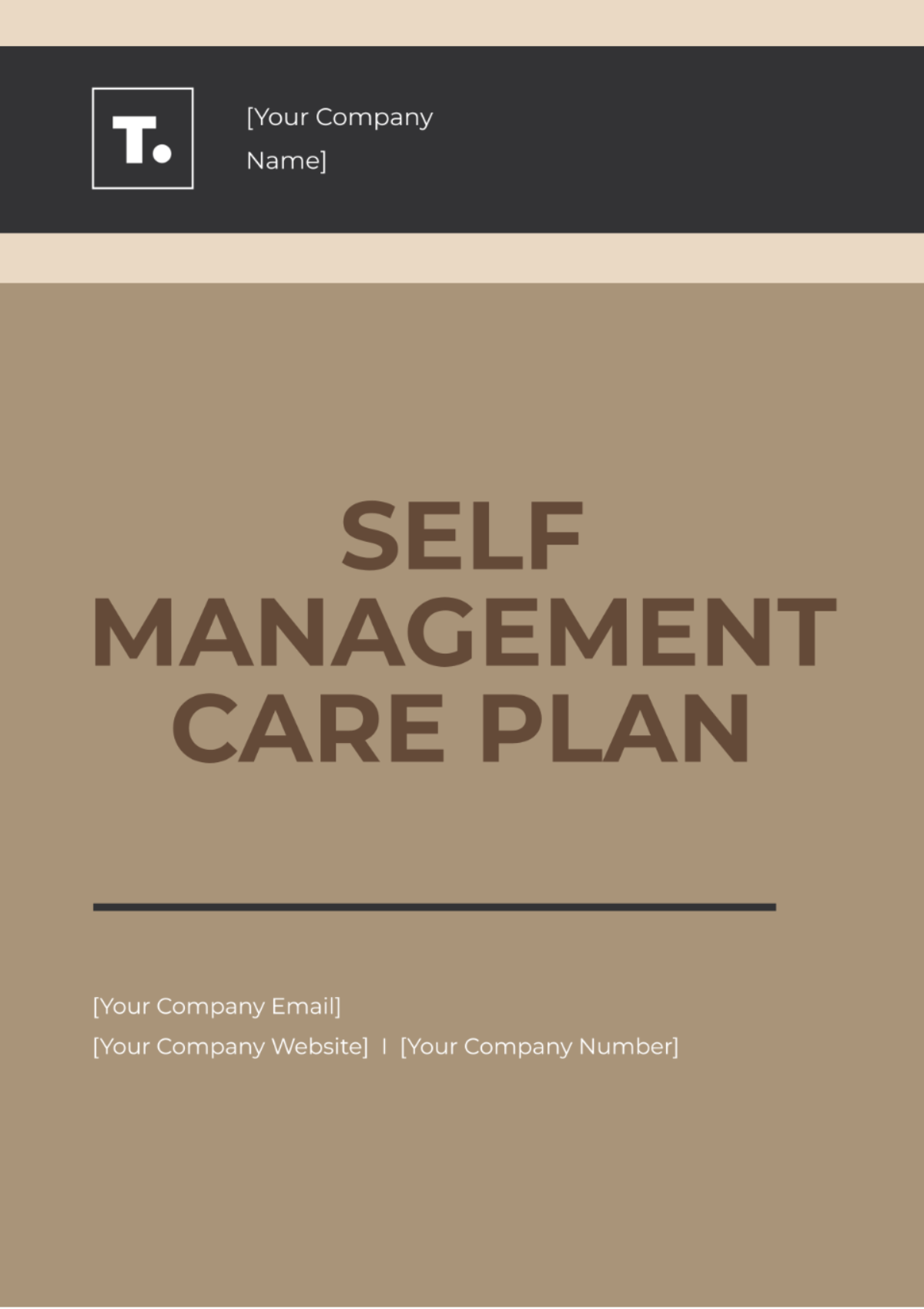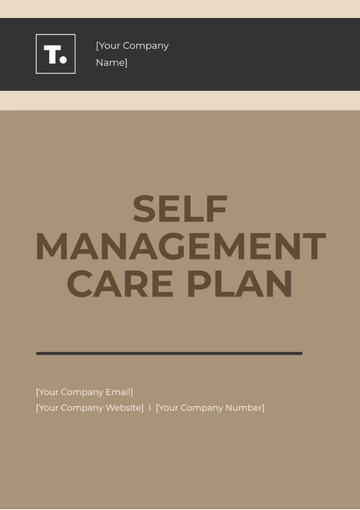Free Self Management Care Plan

_____________________________________________________________________________________
I. Introduction
[Your Name] is a [Age]-year-old [Sex] diagnosed with type 2 diabetes mellitus. The purpose of this Self Management Care Plan is to outline strategies for managing [his/her] diabetes effectively and promoting [his/her] overall health and well-being.
_____________________________________________________________________________________
II. Goal Setting
Achieve and maintain blood glucose levels within the target range of 80-130 mg/dL before meals and less than 180 mg/dL after meals.
Lose 10 pounds over the next six months through a combination of dietary modifications and regular exercise.
Monitor blood pressure and maintain it below 130/80 mmHg.
Engage in physical activity for at least 30 minutes five days a week.
_____________________________________________________________________________________
III. Action Plan
Medication Management
Take Metformin 1000 mg twice daily with meals as prescribed by the physician.
Monitor blood glucose levels regularly using a glucometer and record results in a log.
Dietary Modifications
Follow a balanced diet rich in fruits, vegetables, lean proteins, and whole grains.
Limit intake of high-sugar and processed foods.
Monitor portion sizes and avoid skipping meals.
Physical Activity
Incorporate aerobic exercises such as brisk walking, swimming, or cycling into the daily routine.
Gradually increase exercise duration and intensity over time.
Consult with a fitness trainer to develop a personalized exercise plan.
Stress Management
Practice relaxation techniques such as deep breathing, meditation, or yoga to reduce stress levels.
Identify and address sources of stress, including work, relationships, or financial concerns.
Regular Monitoring
Measure blood glucose levels before meals, two hours after meals, and at bedtime.
Monitor blood pressure at home using a reliable blood pressure monitor.
Keep track of physical activity and dietary intake in a daily journal.
Monitoring and Evaluation
Review blood glucose logs weekly to identify patterns and trends.
Schedule regular follow-up appointments with the physician every three months for comprehensive diabetes management.
Monitor weight loss progress monthly and adjust dietary and exercise plans accordingly.
Assess blood pressure readings weekly and report any significant changes to the healthcare provider.
_____________________________________________________________________________________
IV. Resources and Support
Diabetes education classes are offered at the local community center.
Support groups for individuals living with diabetes.
Online resources such as reputable websites and mobile apps for tracking food intake, physical activity, and medication adherence.
_____________________________________________________________________________________
V. Emergency Plan
In case of hypoglycemia (blood sugar < 70 mg/dL), treat with 15 grams of fast-acting carbohydrates such as glucose tablets or juice.
If symptoms persist or blood sugar does not rise within 15 minutes, seek medical assistance.
In case of hyperglycemia (blood sugar > 250 mg/dL), follow the "sick day" guidelines provided by the healthcare provider.
Contact emergency services immediately if experiencing symptoms of diabetic ketoacidosis (DKA) such as nausea, vomiting, abdominal pain, or confusion.
_____________________________________________________________________________________
- 100% Customizable, free editor
- Access 1 Million+ Templates, photo’s & graphics
- Download or share as a template
- Click and replace photos, graphics, text, backgrounds
- Resize, crop, AI write & more
- Access advanced editor
Manage your health effortlessly with Template.net's Self Management Care Plan Template. This fully customizable and editable template ensures you stay on top of your health goals. Editable in our Ai Editor Tool, it offers seamless personalization to fit your unique needs. Simplify your self-care routine today with this essential resource from Template.net.
You may also like
- Finance Plan
- Construction Plan
- Sales Plan
- Development Plan
- Career Plan
- Budget Plan
- HR Plan
- Education Plan
- Transition Plan
- Work Plan
- Training Plan
- Communication Plan
- Operation Plan
- Health And Safety Plan
- Strategy Plan
- Professional Development Plan
- Advertising Plan
- Risk Management Plan
- Restaurant Plan
- School Plan
- Nursing Home Patient Care Plan
- Nursing Care Plan
- Plan Event
- Startup Plan
- Social Media Plan
- Staffing Plan
- Annual Plan
- Content Plan
- Payment Plan
- Implementation Plan
- Hotel Plan
- Workout Plan
- Accounting Plan
- Campaign Plan
- Essay Plan
- 30 60 90 Day Plan
- Research Plan
- Recruitment Plan
- 90 Day Plan
- Quarterly Plan
- Emergency Plan
- 5 Year Plan
- Gym Plan
- Personal Plan
- IT and Software Plan
- Treatment Plan
- Real Estate Plan
- Law Firm Plan
- Healthcare Plan
- Improvement Plan
- Media Plan
- 5 Year Business Plan
- Learning Plan
- Marketing Campaign Plan
- Travel Agency Plan
- Cleaning Services Plan
- Interior Design Plan
- Performance Plan
- PR Plan
- Birth Plan
- Life Plan
- SEO Plan
- Disaster Recovery Plan
- Continuity Plan
- Launch Plan
- Legal Plan
- Behavior Plan
- Performance Improvement Plan
- Salon Plan
- Security Plan
- Security Management Plan
- Employee Development Plan
- Quality Plan
- Service Improvement Plan
- Growth Plan
- Incident Response Plan
- Basketball Plan
- Emergency Action Plan
- Product Launch Plan
- Spa Plan
- Employee Training Plan
- Data Analysis Plan
- Employee Action Plan
- Territory Plan
- Audit Plan
- Classroom Plan
- Activity Plan
- Parenting Plan
- Care Plan
- Project Execution Plan
- Exercise Plan
- Internship Plan
- Software Development Plan
- Continuous Improvement Plan
- Leave Plan
- 90 Day Sales Plan
- Advertising Agency Plan
- Employee Transition Plan
- Smart Action Plan
- Workplace Safety Plan
- Behavior Change Plan
- Contingency Plan
- Continuity of Operations Plan
- Health Plan
- Quality Control Plan
- Self Plan
- Sports Development Plan
- Change Management Plan
- Ecommerce Plan
- Personal Financial Plan
- Process Improvement Plan
- 30-60-90 Day Sales Plan
- Crisis Management Plan
- Engagement Plan
- Execution Plan
- Pandemic Plan
- Quality Assurance Plan
- Service Continuity Plan
- Agile Project Plan
- Fundraising Plan
- Job Transition Plan
- Asset Maintenance Plan
- Maintenance Plan
- Software Test Plan
- Staff Training and Development Plan
- 3 Year Plan
- Brand Activation Plan
- Release Plan
- Resource Plan
- Risk Mitigation Plan
- Teacher Plan
- 30 60 90 Day Plan for New Manager
- Food Safety Plan
- Food Truck Plan
- Hiring Plan
- Quality Management Plan
- Wellness Plan
- Behavior Intervention Plan
- Bonus Plan
- Investment Plan
- Maternity Leave Plan
- Pandemic Response Plan
- Succession Planning
- Coaching Plan
- Configuration Management Plan
- Remote Work Plan
- Self Care Plan
- Teaching Plan
- 100-Day Plan
- HACCP Plan
- Student Plan
- Sustainability Plan
- 30 60 90 Day Plan for Interview
- Access Plan
- Site Specific Safety Plan


